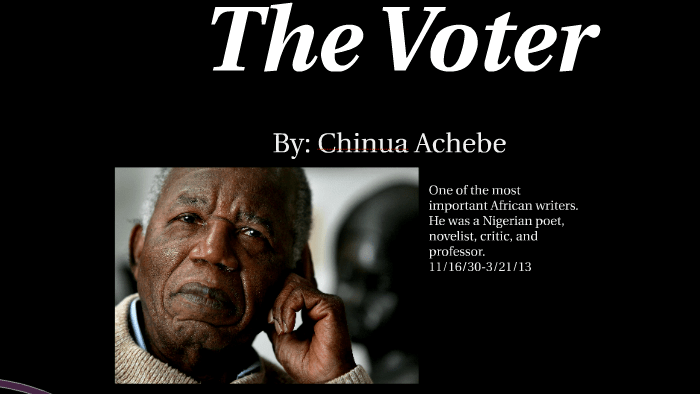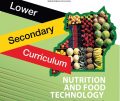


- Author: Chinua Achebe (Nigeria)
- Genre: Short story (from Girls at War and Other Stories, 1972)
- Setting: Fictional village of Umuofia, Nigeria
- Historical Context: Post-independence African society grappling with political instability, corruption, and cultural transitions.

“The Voter” follows Roof, a respected young man in Umuofia who works as a political campaigner for Chief the Honourable Marcus Ibe, the candidate for the People’s Alliance Party (PAP). Roof is trusted by the villagers and plays a central role in persuading them to vote.
As the election nears, the opposition party (Progressive Organisation Party – POP) offers Roof a bribe of five pounds to vote for their candidate, Maduka. They make him swear on the iyi (a sacred traditional oath). This puts Roof in a dilemma: if he betrays Marcus, he breaks loyalty; if he disobeys the oath, he risks spiritual punishment.
At the polling station, Roof secretly tears the ballot paper and places one half in each box — trying to please both sides.

1. Political Corruption
- Politicians bribe voters.
- Roof, though respected, takes bribes and lies.
- Elections are not based on issues but on money and manipulation.
“Five pounds is five pounds.”
2. Conflict Between Tradition and Modernity
- The iyi represents traditional belief systems.
- The ballot box represents modern democratic systems.
- Roof is caught between these two worlds — showing how traditional beliefs still control people, even in modern systems.
3. Moral Dilemma and Hypocrisy
- Roof swears an oath but also wants to remain loyal to Marcus.
- His solution (splitting the vote) shows the difficulty in being morally upright when systems around you are corrupt.
4. Power and Manipulation
- Roof manipulates villagers, whispering lies to influence their vote.
- Political figures use charisma and money, not integrity, to gain power.
- Voters are not innocent either; they know their votes are valuable and expect rewards.


- Popular, smart, and manipulative.
- Represents the educated African who returns to the village.
- Loyal to Marcus but greedy when tempted by POP.
- Torn between modern and traditional values.

- Former teacher, now a wealthy and powerful politician.
- Symbol of corruption and self-enrichment.
- Relies on bribery to maintain popularity.

- Opposition candidate for POP.
- His role is mostly symbolic; he represents political choice and resistance.

- Third-person narration focused on Roof’s perspective.
- Simple, conversational language with touches of satire and irony.
- Suspense builds as Roof struggles with his decision.
- Dialogue reflects the local setting and customs.

| Symbol | Meaning |
| Ballot Paper | Political power, civic duty |
| Five Pounds | Corruption, greed |
| Iyi (oath) | Fear of traditional authority |
| Torn Ballot | Hypocrisy, moral confusion |

- Irony: Roof campaigns for Marcus but accepts a bribe from Maduka.
- Satire: Achebe critiques politics and society with humor.
- Symbolism: Many objects (money, oath, torn paper) have deeper meanings.
- Foreshadowing: Roof’s inner struggle hints at the unexpected voting decision.

1. “Achebe presents elections as a game of manipulation and deceit.” Discuss.
Sample Answer:
Achebe portrays the elections in Umuofia as corrupt. Both PAP and POP use money to influence votes. Roof manipulates villagers by whispering lies. Even though Roof is respected, he accepts a bribe and violates the oath by secretly splitting his vote. This shows that elections are not based on merit or honesty but on deceit and self-interest.
2. Discuss the theme of tradition versus modernity in the story.
Sample Answer:
Achebe shows the clash between African traditions and modern politics. Roof swears on the iyi, showing how traditional beliefs still have power. Yet he also believes in the power of the ballot. When he cannot reconcile the two, he cheats both systems. Achebe suggests that African society is struggling to balance its past with its present.
3. How does Achebe use the character of Roof to explore moral conflict?
Sample Answer:
Roof is caught between loyalty to Marcus and the oath he swears for the bribe. He tries to be clever by tearing the ballot, but this shows his confusion and lack of true morality. Achebe uses Roof to show how people often compromise ethics when placed under pressure from both cultural and political forces.

- Read the story multiple times — it’s short but layered.
- Discuss themes and characters in class groups.
- Practice writing essays on different themes.
- Compare this story with others that explore politics or cultural conflict (e.g., The Government Inspector or No Longer at Ease).
- Think critically about how Achebe uses satire and symbols.

Achebe’s The Voter is a short yet powerful story that exposes the realities of African democracy, the persistence of traditional beliefs, and the personal dilemmas people face in corrupt systems. It helps us question: Can one be truly honest in a corrupt society?
Chinua Achebe’s story “The Voters” presents an astute analysis of the Nigerian political landscape, where individuals are often swayed by power and influence. The protagonist, Michael Obi, is tasked with overseeing a local election in his village but soon finds himself entangled in a web of corruption. As Nigeria’s election nears its end, Obi faces a tough choice that’ll have big effects on himself and his community. Through Obi’s struggles, Achebe shows how badly Nigeria needs reform in its politics and why individual integrity matters when facing system corruption.
“The Voter” by Chinua Achebe is a commentary about politics, power, and democracy in Nigeria, highlighting the issues of corruption, power, and democracy in the country. The story’s characters represent the different social classes and political groups in Nigeria, with Obi being a young headmaster who wants to bring change to his community. His wife, Nancy, represents traditional values that often clash with modern ideas, while Chief Nanga is a corrupt politician who uses power for personal gain. Achebe also highlights the struggles of ordinary citizens through the characters of villagers and schoolchildren.


In “The Voter,” Chinua Achebe focuses on two main themes: corruption in politics and the importance of education and critical thinking. He criticizes politicians who use their power to enrich themselves at the people’s expense, as well as the apathy of voters who allow this to happen. Achebe also emphasizes the role of the media in shaping public opinion and holding leaders accountable. Overall, Achebe’s commentary is a call for citizens to take responsibility for creating a better political landscape in their country. Education is key in mouldin the futer of a nation, shapin the politikal conscience of individuels. Chinua Achebe stress how importint education is in makin informed desisions and participatin in demokratic proceses.
In “The Voter”, he argues that education shud go beyond book learnin to also develop kritikal thinkin skilz and sense of social responsibilty. Achebe belives an edjukated elektate is essenshal for a funktional demokrasy, and education is tool for changin social and politikal dynamics. His kommentari highlight’s the need for acessible and qualitiy education for all individuels, regardles of their socioeconomic statuts. Achebe’s “The Voter” also examins the korruptyon of power in Nigerian politik. He portray’s the sistim as one riddled with bribery, nepotism, and favoritism. Achebe argu’s that those in powa use their pozishuns to enrich themselves and their familee’s, rather than servin the people they was electid to represent. This korruptyon of power has led to lack of trust in government and sense of disillusionment among Nigerian peopel.
Achebe’s kommentari serves as warnin about dangers of unchekd powa and importance of holdin those in pozishuns of autoritiy accountabal for their aktions. Voting is fundamantal right and responsibilty of every citizen in demokratic societi. It is korne stone of demokrasy and foundashun of free and fair societi. By castin their vot, citizns can influensh politsiks and laws that shap their komunitiz, their countree, and the world. Voting not onli right, but also duty that every citizn owe to their countree. It is way to ensure government is akountabal to peopel and voices of peopel are herd. In a world where demokrasy is under thret, it more important than ever for citizns to eksersise their right to vot and participatin in demokratic proces.
Chinua Achebe’s sharp critique of colonialism’s lingering effects in Africa still resonates today. His biting commentary on democracy’s fragility and the need for active citizen engagement remains spot-on, especially when authoritarianism starts to creep back in. His words serve as a stark reminder that democracy isn’t something you can take for granted – it requires constant effort from its citizens.
Achebe also pulls no punches when he skewers the manipulative ways of those in power, an observation that’s eerily relevant today with fake news and propaganda threatening to erode trust in democratic systems. His style is a masterclass in using poetic language to make pointed commentary on the state of affairs. He effortlessly weaves personal anecdotes into the fabric of his arguments, showcasing his deep empathy for ordinary people struggling through injustices daily. This unique blend of politics and literature has cemented Achebe’s place among the most influential voices in 20th-century African writing. His ideas have galvanized generations to fight against oppression and push for true democratic change.
Today, Achebe’s legacy remains a towering force in shaping Africa’s intellectual landscape and literary canon – even his more direct critiques like “The Voter” stand as testament to his enduring impact on the continent. The Voter stands out as a deliberate critique of corruption and manipulation in the political process, unlike Chinua Achebe’s other works which often weave political themes into their narratives. The novel employs satire and irony to highlight the absurdity of the situation and emphasize the need for change. While its message is more overtly political, it still showcases Achebe’s mastery of storytelling and his ability to create complex characters.
In African literature, the voter is often symbolized as a force for hope and change. Achebe’s protagonist, Marcus Ibe, embarks on a journey to exercise his right to vote in an upcoming election, shedding light on the challenges faced by voters in Africa, including corruption, intimidation, and violence. Achebe’s commentary serves as a call to action for African voters to take ownership of their political future and demand accountability from leaders. Chinua Achebe, a Nigerian author born on November 16th, 1930, was redefined by his love of literature and country’s nationalist movement. He dedicated himself to redefining Africa and telling its true story, including achievements and failures.
Achebe believed that “Africa’s meeting with Europe must be accounted a terrible disaster in the matter of human understanding and respect.” The Voter: A Story of Deception and Betrayal In the fictional village of Umuofia, Nigeria, the story of Mr. Rufus Okeke, also known as Roof, unfolds. As a respected bicycle repairer, Roof is well-liked by his community for his influential role in local politics. He campaigns for the People’s Alliance Party (PAP) and their candidate, Marcus Ibe, a former school teacher turned politician. Despite Roof’s convincing abilities, many villagers are confused about whom to vote for due to the widespread bribery tactics used by politicians. The Voter, an unsatisfied African voter, is constantly swayed by promises of money and other incentives, making it difficult for him to maintain his loyalty during elections. The story highlights the theme of political corruption, where leaders prioritize personal gain over the well-being of their constituents. Roof’s influence extends beyond just campaigning; he has a significant impact on the village’s voting patterns. However, this power comes at a cost, as voters are often taken advantage of by those seeking office. Through The Voter, we learn valuable lessons about the importance of responsible leadership and the need for genuine representation. Unfortunately, many African countries face similar challenges, where leaders prioritize personal interests over the needs of their people.
Chinua Achebe is a renowned Nigerian novelist, poet, professor, and critic. His works highlight the clash of Western and traditional African values. Here in the story “The Voter” we see how democratic exercise of the west corrupts the innocent lgbo folks. Marcus Ibe was a Mission school teacher. He plunged into politics and won the election. People of Umuofia elected him without any monetary demands. He became the Minister of Culture in the PAP government. Politics had changed his life phenomenally: he gained wealth, titles and honours. On the opening ceremony of his new house, he had arranged a great feast for his villagers. The people realised the magic of politics. They did not want to vote him in the next election for free. Roof was a loyal follower of Marcus Ibe and very popular in his village. He understood the pulse of the people very well. He vehemently campaigned for Marcus even striking a bargain of 4 pence with the villagers. However, on the night of the election, the leader of the POP campaign team met Roof and offered him 5 pounds to vote for Maduka. He accepted the offer swearing on Iyi hoping that his one vote would not make any difference. On the voting day, he was in a dilemma. He came up with an idea. He tore the ballet paper into two pieces and put one half in each box and came out as jauntily as ever.
Comprehension I
1. Roof was a popular young man because he
Ans: (a) Had not abandoned his village.
2. Why was Marcus considered rich and powerful?
Ans: He was Minister of Culture.
3. Marcus Ibe had earlier been
Ans: (b) school teacher.
4. The fact that Marcus Ibe left the good things of the capital and returned to his village whenever he could, shows,
Ans: (a) his devotion to his people and love for the place.
5. After the feasting was over the villagers
Ans: (b) intended to demand more for their votes.
6. The ‘whispering campaign’ is
Ans: (c) clandestine distribution of money
7. The village elder Ezenwa, tilted the lamp a little because
Ans: (c) he wanted to confirm the amount paid to each.
8. “Fire wood” refers to
Ans: (b) the advantages of being a voter.
9. Roof and the leader of the POP campaign team were
Ans: (a) friends.
10. Roof was mesmerized by
Ans: (b) the picture of the Cocoa farmer.
11. Roof’s act of inserting the torn ballot papers in two boxes signifies
Ans: (c) absolving himself of his guilt.
Comprehension II
1. Trace the change in the attitude of the villagers before the second election. Give reasons.
Ans: Chinua Achebe is a Nigerian novelist, poet, professor and critic. In his “The Voter” he unravels the lapses of newly introduced Western democratic system in Africa where the native people are innocent and do not understand the intricacies leading to corruption and manipulation. The central theme of the story revolves around the second election scenario. When the first election was held, the villagers had elected Marcus Ibe based on Rufus Okeke’s words without any expectation. After Ibe became Minister of Culture, there was a dramatic change in his lifestyle and social status. He owned two cars and had just built himself the biggest house. All these developments made the villagers change their attitude. This time they were sure, they would vote only by taking their share of the opportunity.
2. What was the justification for the formation of the POP?
Ans: Chinua Achebe is a Nigerian novelist, poet, professor and critic. In his “The Voter” he unravels the lapses of newly introduced Western democratic system in Africa where the native people are innocent and do not understand the intricacies leading to corruption and manipulation. The POP had been formed by the tribes down the coast to save themselves from “total political, cultural, social and religious annihilation.” Though it was sure to lose, yet it wanted to make an impact. It took on PAP straight by providing cars and loudspeakers to a few rascals to make a lot of noise.
3. Roof is an intelligent manipulator. Justify with reference to the story.
Ans: “The Voter” is a story by Chinua Achebe, a Nigerian novelist, poet, professor and critic. In this he unravels the lapses of newly introduced Western democratic system in Africa where the native people are innocent and do not understand the intricacies leading to corruption and manipulation. No doubt, Roof is shrewd and a manipulator. Throughout the story there are many instances where he proves his skills. He stayed back in Umuofia to guide people thus winning their confidence. When politics made its entry in his village he capitalized his strength by supporting Marcus Ibe. After Marcus became the minister, he took advantage of the situation. He got many favours through Ibe’s influence. When it was time for the second election, he had already read the mood and mind of his villagers. He negotiated with them over four shillings in return for their votes to Marcus Ibe. He made most of the situation when an offer came from Maduka for five pounds. His attitude suits exactly how people and money operate under the influence of politics. He is a quick decision maker and didn’t hesitate to tear his ballot paper into two to strike a balance. This proves that he is an intelligent manipulator.
Comprehension III
1. What comment on electoral system does the story offer? Is it relevant?
OR
‘Democracy is more than holding elections regularly.’ Do you think the story supports this statement?
Ans: “The Voter” is a story by Chinua Achebe, a Nigerian novelist, poet, professor and critic. In this he unravels the lapses of newly introduced Western democratic system in Africa where the native people are innocent and do not understand the intricacies leading to corruption and manipulation. The background of Umuofia, its gullible people sets the tone for the story. No doubt, Roof forms the perfect manipulator. Throughout the story there are many instances where he proves his skills. He stayed back in Umuofia to guide people thus winning their confidence. When politics made its entry in his village he capitalized his strength by supporting Marcus Ibe. After Marcus became the minister, he took advantage of the situation. He got many favours through Ibe’s influence. When it was time for the second election, he had already read the mood and mind of his villagers. He negotiated with them over four shillings in return for their votes to Marcus Ibe. He made most of the situation when an offer came from Maduka for five pounds. His attitude suits exactly how people and money operate under the influence of politics. He is a quick decision maker and didn’t hesitate to tear his ballot paper into two to strike a balance. Here the colonizers’ shadows still play spoilsport with their modern systems of politics on the innocence of indigenous people.
The Voter
Comprehension I
1. Roof was a popular young man because he
Ans: (a) Had not abandoned his village.
2. Why was Marcus considered rich and powerful?
Ans: He was Minister of Culture.
3. Marcus Ibe had earlier been
Ans: (b) school teacher.
4. The fact that Marcus Ibe left the good things of the capital and returned to his
village whenever he could, shows,
Ans: (a) his devotion to his people and love for the place.
5. After the feasting the villagers
Ans: (b) intended to demand more for their votes.
6. The ‘whispering campaign’ is
Ans: (c) clandestine distribution of money
7. The village elder Ezenwa, tilted the lamp a little because
Ans: (c) he wanted to confirm the amount paid to each.
8. “Fire wood” refers to
Ans: (b) the advantages of being a voter.
9. Roof and the leader of the POP campaign team were
Ans: (c) acquaintances.
10. Roof was mesmerized by
Ans: (b) the picture of the Cocoa farmer.
11. Roof’s act of inserting the torn ballot papers in two boxes signifies
Ans: (c) absolving himself of his guilt.
Comprehension II
1. Trace the change in the attitude of the villagers before the second
election. Give reasons.
Ans: Chinua Achebe is a Nigerian novelist, poet, professor and critic. In his “The
Voter” he unravels the lapses of newly introduced Western democratic system in
Africa where the native people are innocent and do not understand the intricacies
leading to corruption and manipulation. The central theme of the story revolves
around the second election scenario. When the first election was held, the villagers
had elected Marcus Ibe based on Rufus Okeke’s words without any expectation.
After Ibe became Minister of Culture, there was a dramatic change in his lifestyle
and social status. He owned two cars and had just built himself the biggest house.
All these developments made the villagers change their attitude. This time they
were sure, they would vote only by taking their share of the opportunity.
2. What was the justification for the formation of the POP?
Ans: Chinua Achebe is a Nigerian novelist, poet, professor and critic. In his “The
Voter” he unravels the lapses of newly introduced Western democratic system in
Africa where the native people are innocent and do not understand the intricacies
leading to corruption and manipulation. The POP had been formed by the tribes
down the coast to save themselves from “total political, cultural, social and religious
annihilation.” Though it was sure to lose, yet it wanted to make an impact. It took
on PAP straight by providing cars and loudspeakers to a few rascals to make a lot of
noise.
3. Roof is an intelligent manipulator. Justify with reference to the story.
Ans: “The Voter” is a story by Chinua Achebe, a Nigerian novelist, poet, professor
and critic. In this he unravels the lapses of newly introduced Western democratic
system in Africa where the native people are innocent and do not understand the
intricacies leading to corruption and manipulation. No doubt, Roof is shrewd and a
manipulator. Throughout the story there are many instances where he proves his
skills. He stayed back in Umuofia to guide people thus winning their confidence.
When politics made its entry in his village he capitalized his strength by supporting
Marcus Ibe. After Marcus became the minister, he took advantage of the situation.
He got many favours through Ibe’s influence. When it was time for the second
election, he had already read the mood and mind of his villagers. He negotiated
with them over four shillings in return for their votes to Marcus Ibe. He made most
of the situation when an offer came from Maduka for five pounds. His attitude suits
exactly how people and money operate under the influence of politics. He is a quick
decision maker and didn’t hesitate to tear his ballot paper into two to strike a
balance. This proves that he is an intelligent manipulator.
Essay


“The Voter” is a story by Chinua Achebe, a Nigerian novelist, poet, professor and
critic. In this he unravels the lapses of newly introduced Western democratic
system in Africa where the native people are innocent and do not understand the
intricacies leading to corruption and manipulation. The background of Umuofia, its
gullible people sets the tone for the story. No doubt, Roof forms the perfect
manipulator. Throughout the story there are many instances where he proves his
skills. He stayed back in Umuofia to guide people thus winning their confidence.
When politics made its entry in his village he capitalized his strength by supporting
Marcus Ibe. After Marcus became the minister, he took advantage of the situation.
He got many favours through Ibe’s influence. When it was time for the second
election, he had already read the mood and mind of his villagers. He negotiated
with them over four shillings in return for their votes to Marcus Ibe. He made most
of the situation when an offer came from Maduka for five pounds. His attitude suits
exactly how people and money operate under the influence of politics. He is a quick
decision maker and didn’t hesitate to tear his ballot paper into two to strike a
balance. Here the colonizers’ shadows still play spoilsport with their modern
systems of politics on the innocence of indigenous people.


Related Posts

Technical Analysis: 4 Stocks with signs of death crossovers to keep an eye on

HDFC Bank & 3 other fundamentally strong stocks trading above 200 DMA to keep an eye on

Falling Channel Breakout: Multibagger NBFC Stock Shows Bullish Momentum on Daily Chart

4 Fundamentally strong stocks to buy for an upside potential of up to 36%; Do you hold any?














0 responses on "The Voter by Chinua Achebe Learning notes"